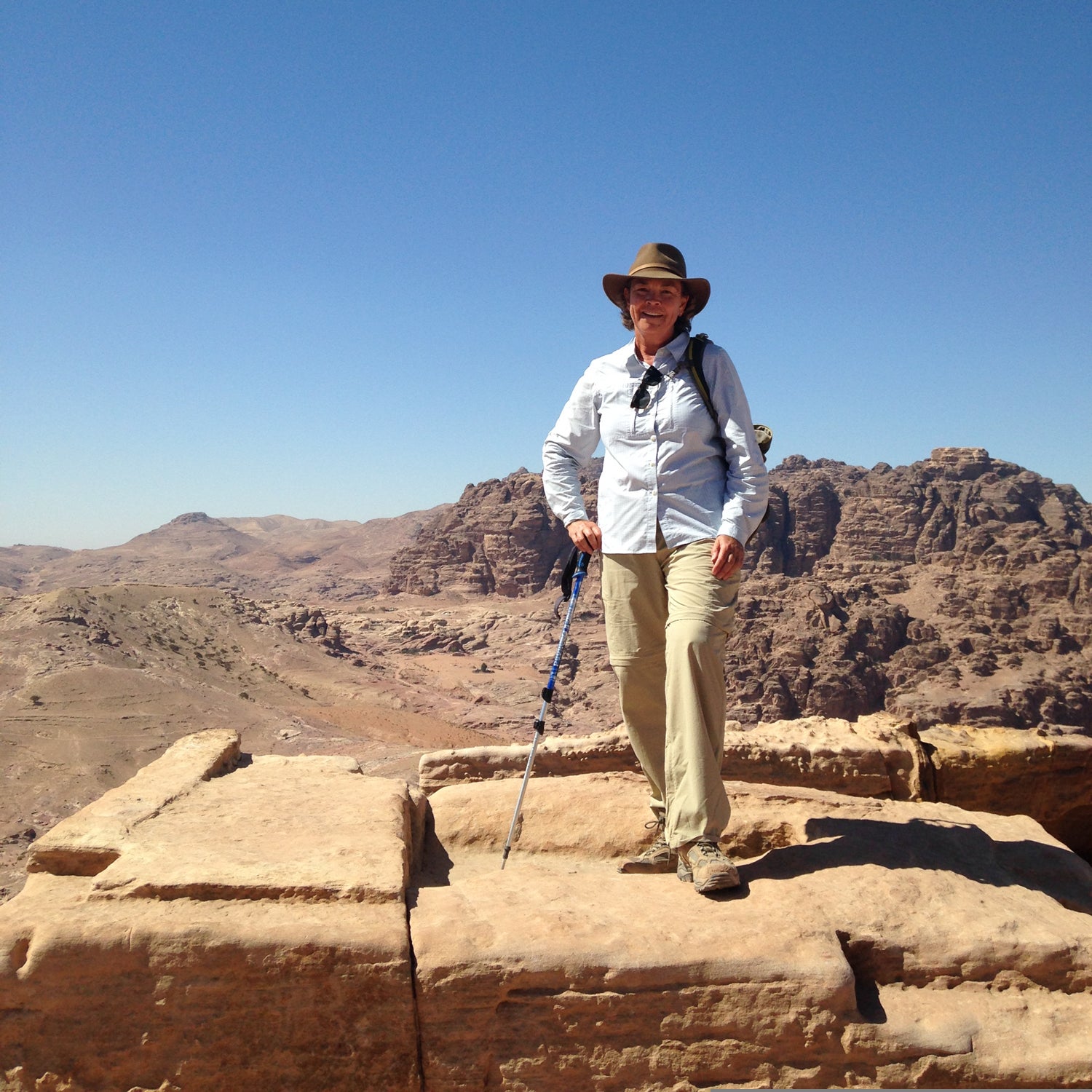Most couples would be plotting their retirement after a 30-year career in the hospitality business. But Nicky Fitzgerald and her husband, Steve, thrive on running businesses and delighting guests. During their 15-year stint developing lodges in Africa and India for luxury safari operator , the couple lusted after a 700-acre plot of land in . In 2013, just as the couple was contemplating what to do next, the lease became available, and within 24 hours, they embarked on their most ambitious hospitality venture yet, . The couple raised nearly $18 million through an aggressive global fundraising campaign for the 30-tent camp, which opened in June 2015 after a whirlwind 11-month construction effort. “Angama is our swan song,” says Nicky. “When it’s your baby, you don’t mind working 24 hours a day. Who needs retirement when you get to bring people joy every day in a beautiful place?”
Age: 62
Job: Co-founder and co-owner of Angama Mara Safari Lodge
Hometown: Johannesburg, South Africa
Home Base: Johannesburg and the Maasai Mara, Kenya
Education: Arts degree in English and history from the University of Cape Town
Angama Means: “Suspended in midair” in Swahili
Staff: 115; all but two are Kenyan
Legendary Location: Set on the Oloololo Escarpment, 1,000 feet above the Maasai Mara, the lodge is a short walk from the hill where Meryl Streep and Robert Redford picnicked in .
Daily Ritual: “I have a filthy habit of waking up, putting on my glasses, and turning on my phone.”
A Typical Day: “I lead two lives. I’m in Johannesburg seven to ten days a month to run the business of the business: finding guests, handling marketing and sales with my daughter Kate. We have a small office with a staff of eight. Sometimes Kate and I are on the road telling our story. The rest of the time, I’m at the lodge frying eggs and fluffing cushions. I walk the property, then join the staff for breakfast at 9 a.m. and attend the staff meeting. I like to chat with the guests. I learn so much about my business through them—how they heard about us, highlights of other lodges they visited. I spend a lot of time in the kitchen, too. I’m a self-taught chef. I create the menus and go to the marketplace to source ingredients and train our chefs. At 3 p.m., sometimes I join guests on a game drive.”
Work-Life Balance Philosophy: “It’s a load of bologna. It’s easier to start with the premise that it doesn’t exist. There’s just life, and it’s made up of some work and some play. You can’t be a perfectionist.
“It doesn’t matter where I am, I’m always working. The day really never starts or ends. If I’m home in Johannesburg cooking supper, I keep my phone by my side. Enquiries come in from all over the world, and I want to be sure people are getting the answers they need. When we can get away, we go to our home on the edge of the , and we can watch the elephants from the sofa with our laptops on our laps.”
Biggest Challenge: “The image of Africa in the international media creates fear. Last year, when Pope Francis visited Kenya, a tourist asked if he was scared—and he joked he was more afraid of mosquitoes than people.”
What People Don’t Understand: “If you don’t like guests, don’t get into this industry. People have this quaint idea about running a little pub in the country or moving to Africa to write poetry. They arrive, and six weeks go by, and they haven’t written a line of poetry. It’s not about the lifestyle at all. If you don’t like serving people, you’ll a) burn out, and b) the clients will pick up on the fact that they’re a means to an end. If you’re not a guest fanatic, don’t do it. If you are, it’s the best thing in the world.”
The Power of Family Business: “People ask what it’s like to work with my husband, and I say, ‘What’s it like not to?’ Our family is in it together, and I think it adds to the guests’ delight to have that mom-and-pop feel and family-owned intimacy. For most families, the parents go to work at 7 a.m., and the children have no view of what they do. Our two daughters grew up in the business. They understood the sacrifices. If their birthday fell on the busiest day of the year, it might go unnoticed, but we’d make it up.
“The girls were on Phi Phi Island in 2004 during the tsunami. Anna, age 22, died. Kate, 19, made it by some miracle, but she was terribly injured and traumatized. Seventeen operations and 12 years later, she is now happily married and a new mother to her three-month-old son. She oversees sales and marketing for us. Anna should be here, too. We miss her every day. Working in this industry—making guests happy—helps us get through the pain. What could be more therapeutic?”
Risk and Responsibility: “Running a lodge is extremely high risk, not just for your investors and backers, but also for the staff and the community. You go into a rural area and employ people and promise them an income, jobs, a future. In rural Africa, you can’t just shut shop. People depend on you, and you need to take that very seriously.”
The Power of Empowerment: “Steven runs the business with total transparency. He sits with the staff every month and goes over what we made or lost. Each department head writes his or her own budget. I think that gives them a sense of ownership. We really try to empower the staff. If a housekeeper decides that a guest needs to fly out that day, he or she doesn’t need to ask permission. I’d rather have someone ask forgiveness than permission. Any staff can make any decision if it is in the best interest of the business.”
Conservation Conundrum: “There’s always a collective gasp when I say we are a guest company, not a conservation company. There is an expectation that just because we’re a lodge in Africa, we have to be a world saver. As a small business, we approach philanthropy with microdonations and scalable projects. Each guest contributes a $10-per-night donation to the , and this allows us to do little things all the time that affect education, health care, and conservation within the community.
“Guests are exhausted and need a great holiday. They’ve saved up and are getting away to save their sex life, their marriage, their sanity. There’s a lot of saving to be done, and then they arrive at a lodge to be lectured about the dying rhino habitat that needs saving. At Angama, first I thank them for coming here and not Dubai. We put them in such a safe, romantic environment where they fall in love with everyone again and are boinking away at night. After three days, they’re ready to ask, ‘What’s it like to work in Kenya?’ and that’s the opening. They go on a community trip and see there’s a need for a new room for a clinic. Don’t badger them about donations. Let them come to it on their own.”


